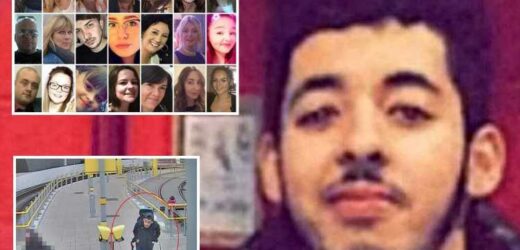SECURITY failures including police officers going for a break to get kebabs led to more deaths in the Manchester Arena bombing, a public inquiry has found.
Suicide bomber Salman Abedi should have been identified as a threat on the night of the attack by those in charge of security, according to the inquiry findings.
Abedi died in the attack on May 22, 2017, along with his 22 victims who had enjoyed an Ariana Grande concert at the MEN Arena.
Manchester-born Abedi, of Libyan descent, detonated his shrapnel-laden device, packed into his bulging rucksack, at 10.31pm just as thousands, including many children, left the concert.
Inquiry chairman Sir John Saunders highlighted missed opportunities to prevent or minimise the "devastating impact".
He concluded there were "significant failures" by the five British Transport Police officers on duty at the Arena venue that night.
'DEVASTATING'
Officers drove five miles to get a kebab, leaving no one on duty in the City Room Foyer of the Arena.
A security guard said he did not approach Abedi as he feared being branded a racist.
Sir John said he considered it likely Salman Abedi would still have detonated his device if confronted "but the loss of life and injury is highly likely to have been less.".
In a damning report, Sir John said: "No-one knows what Salman Abedi would have done had he been confronted before 10.31pm.
"We know that only one of the 22 killed entered the City Room before 10.14pm.
"Eleven of those who were killed came from the Arena concourse doors into the City Room after 10.30pm."
He added: "The security arrangements for the Manchester Arena should have prevented or minimised the devastating impact of the attack.
"They failed to do so. There were a number of opportunities which were missed leading to this failure.
"Salman Abedi should have been identified on 22nd May 2017 as a threat by those responsible for the security of Arena and a disruptive intervention undertaken.
"Had that occurred, I consider it likely that Salman Abedi would still have detonated his device, but the loss of life and injury is highly likely to have been less."
He said Arena operator SMG, its security provider Showsec and British Transport Police, who patrolled the area adjoining Manchester Victoria rail station, were "principally responsible" for the missed opportunities.
Sir John said: "Across these organisations, there were also failings by individuals who played a part in causing the opportunities to be missed."
In a statement, June Tron, mother of Philip Tron, 32, from Gateshead, who was killed in the attack, said it was "extremely hard" listening to evidence about the government's failure to increase security at venues.
Nine security failures
- "No effective steps were taken" when a parent raised concern to a steward about Abedi.
- An untrained security guard did not want to confront Abedi for fear of being labelled racist.
- Police officers took a break and went to get a kebab, leaving no officers on duty.
- There were no security checks on the mezzanine level of the City Room where Abedi was hiding.
- There was a lack of alertness from the guards over the risk of a terror attack.
- From 10pm to 10.30pm, there were no police officers guarding the mezzanine level.
- 8. and 9. On three different occasions, Abedi made hostile reconnaissance missions of the the Arena, which were not spotted. These took place on May 18 and May 21. He undertook a final scouting mission on May 22, shortly after the Arena doors opened.
She said: "We hope that, as a result of this inquiry, many lessons are learned and that laws are introduced and changes made quickly to ensure people can go to a concert or a big public event in confidence that they have the best possible protection."
Home Secretary Priti Patel has said the government will "carefully consider" the inquiry's findings.
Abedi launched the sick mission after he returned from a trip to Libya on May 18.
He waited for around an hour in the Manchester Arena foyer before parents and children left the gig at 10.30pm.
One minute later, he detonated the bomb as 359 people stood in the City Room.
The inquiry was told he made three reconnaissance trips to the venue, adjoining Manchester Victoria rail station, before his fateful last journey.
Security experts considered he may have noticed a CCTV blind spot on the raised mezzanine level of the City Room.
Abedi, dressed in black, crouched down upstairs for nearly an hour, occasionally praying, before he walked down to the foyer.
The inquiry heard no-one from venue operator SMG or its security provider Showsec checked the mezzanine level while Abedi was there after he earlier arrived at Victoria station at about 8.30pm.
'UNACCEPTABLE'
Uniformed officers from British Transport Police (BTP) were tasked to patrol the station, including the City Room, but when the bomb was detonated there were none in the foyer.
It emerged two BTP officers took an "unacceptable" two-hour shift break, including a drive out to buy kebabs, with no officers on duty at the time.
When Abedi made his "final approach" to the City Room, struggling to walk with his rucksack as he carried his heavy rucksack bomb, no officers were patrolling the area around the Arena.
The same officers were praised for their response after the blast – running into the City Room foyer to help those injured.
Among debris found after the blast were 1,675 nyloc nuts, 156 flanged nuts, 663 plain nuts and 11 fragments from Salman Abedi and his victims.
There were also screws recovered by investigators but they were so damaged they couldn't be counted.
Responding to the report, BTP Chief Constable Lucy D'Orsi said: "We are carefully reviewing the findings outlined in Volume One of the Manchester Arena Inquiry report today.
Home Secretary Priti Patel said: "We will now carefully consider the chair's conclusions and recommendations in this report, including his reflections on the Protect Duty which will help shape our consultation response, and respond fully in due course."
Source: Read Full Article










